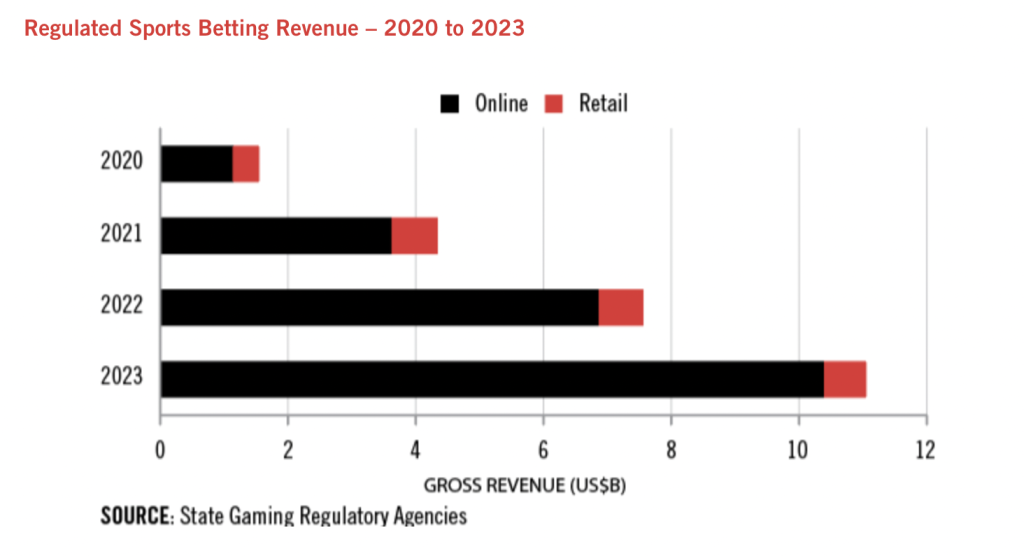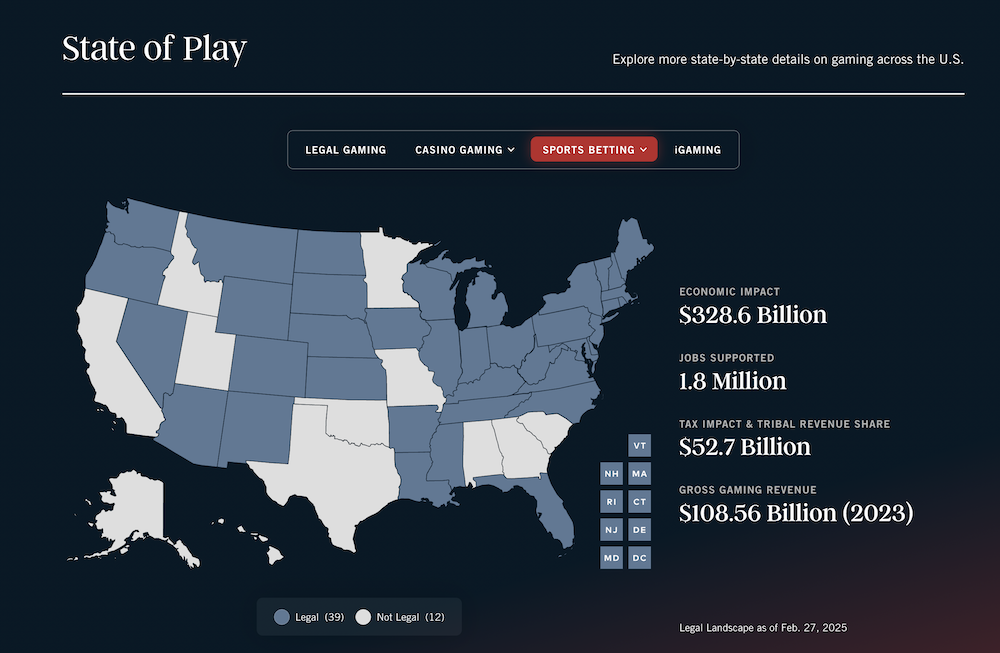
It’s the month of top seeds, big upsets, and Cinderella runs by the underdogs. With March Madness basketball cranking up, a fair share of online betting will be sure to follow—along with online betting scams.
Since a U.S. Supreme Court ruling in 2018, individual states can determine their own laws for sports betting. Soon after, states leaped at the opportunity to legalize it in some form or other. Today, nearly 40 states and the District of Columbia have “live and legal” sports betting, meaning that people can bet on single-game sports through a retail or online sportsbook or a combination of the two in their state.
And it has made billions of dollars for the government.

If you’re a sports fan, this news has probably been hard to miss. Or at least the outcome of it all has been hard to miss. Commercials and signage in and around games promote several major online betting platforms. Ads have naturally made their way online too, complete with all kinds of promo offers to encourage people to get in on the action. However, that’s also opened the door for scammers who’re looking to take advantage of people looking to make a bet online, according to the Better Business Bureau (BBB). Often through shady or outright phony betting sites.
Let’s take a look at the online sports betting landscape, some of the scams that are cropping up, and some things you can do to make a safer bet this March or any time.
Among the 30 states that have “live and legal” sports betting, 19 offer online betting, a number that will likely grow given various state legislation that’s either been introduced or will be introduced soon.

If you’re curious about what’s available in your state, this interactive map shows the status of sports betting on a state-by-state level. Further, clicking on an individual state on the map will give you yet more specifics, such as the names of retail sportsbooks and online betting services that are legal in the state. For anyone looking to place a bet, this is a good place to start. It’s also helpful for people who are looking to get into online sports betting for the first time, as this is the sort of homework that the BBB advises people to do before placing a sports bet online. In their words, you can consider these sportsbooks to be “white-labeled” by your state’s gaming commission.
However, the BBB stresses that people should be aware that the terms and conditions associated with online sports betting will vary from service to service, as will the promotions that they offer. The BBB accordingly advises people to closely read these terms, conditions and offers. For one, “Gambling companies can restrict a user’s activity,” meaning that they can freeze accounts and the funds associated with them based on their terms and conditions. Also, the BBB cautions people about those promo offers that are often heavily advertised, “[L]ike any sales pitch, these can be deceptive. Be sure to read the fine print carefully.”
Where do scammers enter the mix? The BBB points to the rise of consumer complaints around bogus betting sites:
“You place a bet, and, at first, everything seems normal. But as soon as you try to cash out your winnings, you find you can’t withdraw a cent. Scammers will make up various excuses. For example, they may claim technical issues or insist on additional identity verification. In other cases, they may require you to deposit even more money before you can withdraw your winnings. Whatever you do, you’ll never be able to get your money off the site. And any personal information you shared is now in the hands of scam artists.”
If there’s a good reason you should stick to the “white labeled” sites that are approved by your state’s gaming commission, this is it. Take a pass on any online ads that promote betting sites, particularly if they roll out big and almost too-good-to-be-true offers. These may lead you to shady or bogus sites. Instead, visit the ones that are approved in your state by typing in their address directly into your browser.
In addition to what we mentioned above, there are several other things you can do to make your betting safer.
In addition to choosing a state-approved option, check out the organization’s BBB listing at BBB.org. Here you can get a snapshot of customer ratings, complaints registered against the organization, and the organization’s response to the complaints, along with its BBB rating, if it has one. Doing a little reading here can be enlightening, giving you a sense of what issues arise and how the organization has historically addressed them. For example, you may see a common complaint and how it’s commonly resolved. You may also see where the organization has simply chosen not to respond, all of which can shape your decision whether to bet with them or not.
Credit cards are a good way to go. One reason why is the Fair Credit Billing Act, which offers protection against fraudulent charges on credit cards by giving you the right to dispute charges over $50 for goods and services that were never delivered or otherwise billed incorrectly. Your credit card companies may have their own policies that improve upon the Fair Credit Billing Act as well. Debit cards don’t get the same protection under the Act.
Comprehensive online protection software will defend you against the latest virus, malware, spyware, and ransomware attacks plus further protect your privacy and identity. In addition to this, it can also provide strong password protection by generating and automatically storing complex passwords to keep your credentials safer from hackers and crooks who may try to force their way into your accounts. And, specific to betting sites, online protection can help prevent you from clicking links to known or suspected malicious sites.
With online betting cropping up in more and more states for more and more people, awareness of how it works and how scammers have set up their presence within it becomes increasingly important. Research is key, such as knowing who the state-approved sportsbooks and services are, what types of betting are allowed, and where. By sticking to these white-label offerings and reading the fine print in terms, conditions, and promo offers, people can make online betting safer and more enjoyable.
Editor’s Note: If gambling is a problem for you or someone you know, you can seek assistance from a qualified service or professional. Several states have their own helplines, and nationally you can reach out to resources like http://www.gamblersanonymous.org/ or https://www.ncpgambling.org/help-treatment/.
The post How to Protect Yourself from March Madness Scams appeared first on McAfee Blog.

Cybercriminals will always try to cash in on a good thing, and football is no exception. Online scammers are ramping up for the big game with all types of schemes designed to rip you off and steal your personal info—but you have several ways you can beat them at their game.
Like shopping holidays, tax season, and even back-to-school time, scammers take advantage of annual events that get people searching for deals and information online. You can include big games and tournaments in that list too.
Specific to this big game, you can count on several types of scams to rear their heads this time of year—ticket scams, merchandise scams, betting scams, and phony sweepstakes as well. They’re all in the mix, and they’re all avoidable. Here, we’ll break them down.
As of two weeks out, tickets for the big game on the official ticketing website were going for $6,000 or so, and that was for the so-called “cheap seats.” Premium seats in the lower bowl 50-yard line, sold by verified resellers, were listed at $20,000 a pop or higher.
While the game tickets are now 100% mobile, that hasn’t prevented scammers from trying to pass off phony tickets as the real deal. They’ll hawk those counterfeits in plenty of places online, sometimes in sites like your friendly neighborhood Craigslist.
So if you’re in the market for tickets, there are certainly a few things to look out for:
If you plan on enjoying the game closer to home, you may be in the market for some merch—a hat, a jersey, a tee, or maybe some new mugs for entertaining when you host the game at your place. With all the hype around the game, out will come scammers who set up bogus online stores. They’ll advertise items for sale but won’t deliver—leaving you a few dollars lighter and the scammers with your payment information, which they can use on their own for identity fraud.
You can shop safely with a few straightforward steps:
This is a great one to start with. Directly typing in the correct address for reputable online stores and retailers is a prime way to avoid scammers online. In the case of retailers that you don’t know much about, the U.S. Better Business Bureau (BBB) asks shoppers to do their research and make sure that retailer has a good reputation. The BBB makes that easier with a listing of retailers you can search simply by typing in their name.
If you feel like doing extra sleuthing, look up the address of the website and see when it was launched. A visit to the Internet Corporation for Assigned Names and Numbers (ICANN) at ICANN.org gives you the option to search a web address and see when it was launched, along with other information about who registered it. While a recently launched site is not an indicator of a scam site alone, sites with limited track records may give you pause if you want to shop there—particularly if there’s a chance it was just propped up by a scammer.
Look for the lock icon in your browser when you shop.
Secure websites begin their address with “https,” not just “http.” That extra “s” in stands for “secure,” which means that it uses a secure protocol for transmitting sensitive info like passwords, credit card numbers, and the like over the internet. It often appears as a little padlock icon in the address bar of your browser, so double-check for that. If you don’t see that it’s secure, it’s best to avoid making purchases on that website.
Credit cards are a good way to go. One reason why is the Fair Credit Billing Act, which offers protection against fraudulent charges on credit cards by giving you the right to dispute charges over $50 for goods and services that were never delivered or otherwise billed incorrectly. Your credit card companies may have their own policies that improve upon the Fair Credit Billing Act as well. Debit cards don’t get the same protection under the Act.
Comprehensive online protection software will defend against the latest virus, malware, spyware, and ransomware attacks plus further protect your privacy and identity. In addition to this, it can also provide strong password protection by generating and automatically storing complex passwords to keep your credentials safer from hackers and crooks who may try to force their way into your accounts. And, specific to the scams floating around this time of year, online protection can help prevent you from clicking links to known or suspected malicious sites.
It’s hard to watch sports these days without odds and stat lines popping up onto the screen, along with a fair share of ads that promote online betting. If you’re thinking about making things interesting with some betting, keep a few things in mind:
As it is every year, you’ll see kinds of sweepstakes and giveaways leading up to the game, plenty of them legitimate. Yet as they do, scammers will try and blend in by rolling out their own bogus promotions. Their aim: to part you from your cash or even your personal information.
A quick way to sniff out these scams is to take a close look at the promotion. For example, if it asks you to provide your bank information to send you your prize money, count on it being a scam. Likewise, if the promotion asks you to pay to claim a prize in some form or other, it’s also likely someone’s trying to scam you.
In all, steer clear of promotions that ask something for something in return, particularly if it’s your money or personal information.
As it is of late, all kinds of scams will try to glom onto the big game this year. And some of the best advice for avoiding them is not to give in to the hype. Scammers prey on scarcity, a sense of urgency, and keyed-up emotions in general. Their hope is that these things may make you less critical and more likely to overlook things that would otherwise seem sketchy or too good to be true. Staying focused as you shop, place a wager, or otherwise look to round out your enjoyment of the big game is some of your absolute best defense against scammers right now, and any time.
The post Super Scams – Beat the Online Scammers Who Want to Sack Your Big Game appeared first on McAfee Blog.